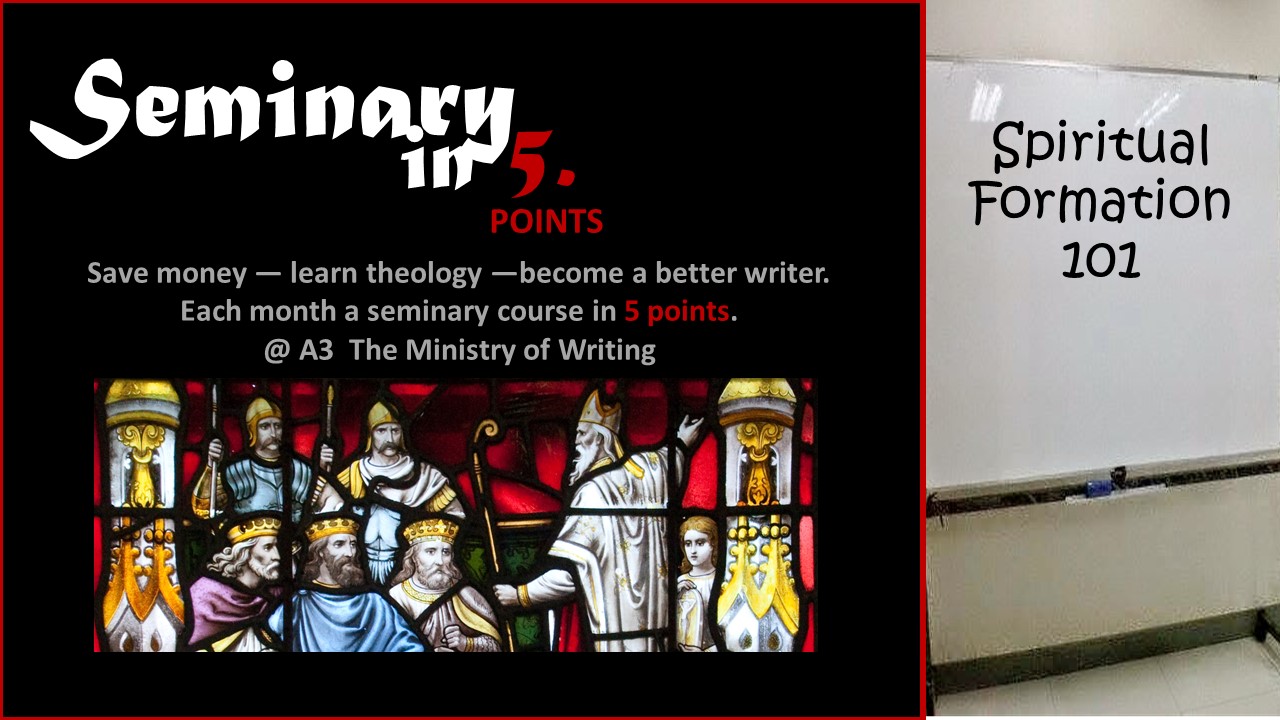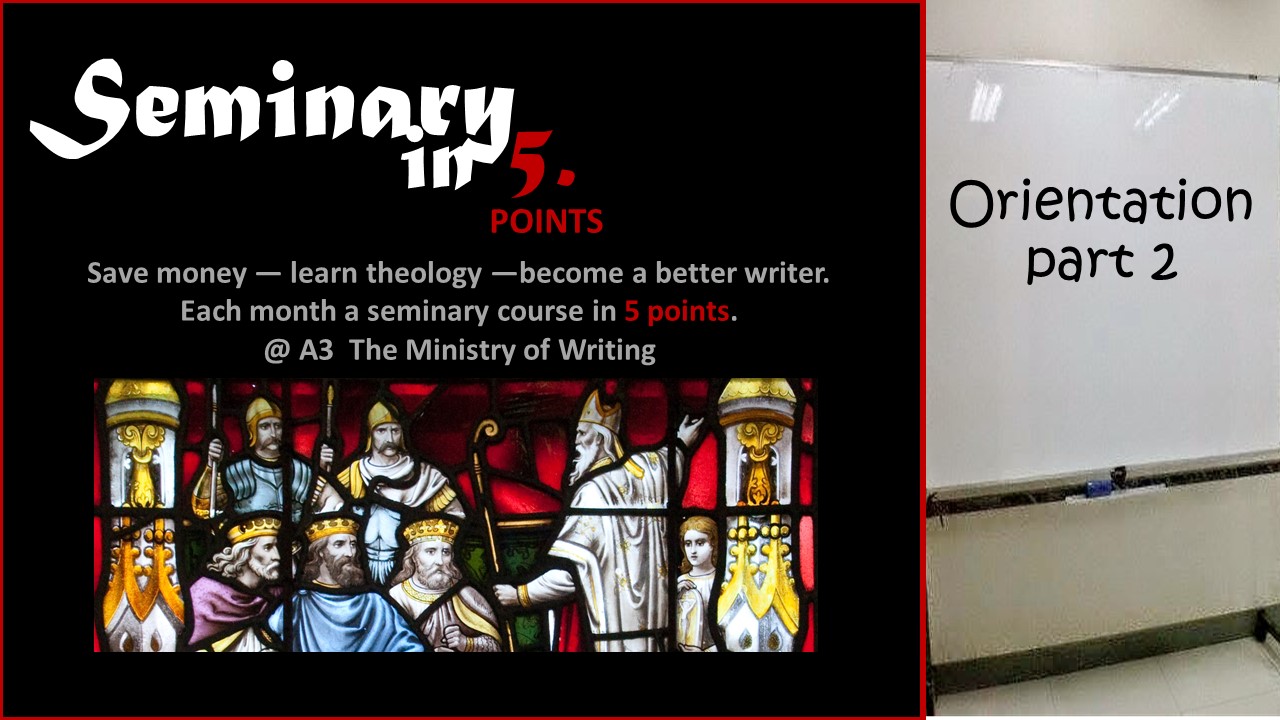Save money. Learn theology. Become a better writer. Minister more effective. That’s my hope for you. In this second year of my column, The Ministry of Writing, I want to take you to seminary — writing seminary. If you have had the chance to go to seminary, then let this be a refresher. If you haven’t please soak up this tuition free theological education given each month in 5 points. God has called you to write. You want to glorify Him and reach the world, but the problem is that we can easily be false teachers and not know it. Therefore, growing and learning in biblical and theological knowledge is vital to your writing ministry.
One of the beauties of being a Christian writer is that we have a manual for all the instruction we provide and all the stories we tell. This manual is, of course, the Bible. Yet, this beautiful resource should also reign us in. For our, writings should be based on an accurate use of that manual. The manual is authoritative and therefore we are not to manipulate it for our own ideas. Therefore, it vitally important that you know your manual. Even the first half of this manual — the Old Testament.
Knowing this manual begins with reading it — reading it all, but we must also go deeper into an intensive study of the Bible. Even when this deeper study occurs sometimes we tend to jump to the details of particular books, passages, narratives, principles, or persons; and, by doing so we miss the big picture. I urge everyone to take a “survey” class or pick up an Old Testament and New Testament survey book. A survey study gives a bird’s eye-view of the text. It helps see the greater picture of what God is up-to and how each individual book fits together. There are also Bible Studies out there that accomplish this task such as The Story and The Gospel Project. The Story focuses on the greater history narrative in how all of the Bible fits together. The Gospel Project aims to trace salvation history throughout Scripture. I highly recommend Paul House and Eric Mitchell’s survey of the Old Testament book. There may be books that give more details, but this book perfectly pieces the books in the Old Testament together.
Here are five key points that you would learn in a survey of the Old Testament.
- The Bible (therefore, the Old Testament) is about God.
After reading this point, it’s likely you replied, “duh.” But before you skip to the next point, take a minute to think about how you utilize and approach the Bible. You may know the fact that the Bible is about God, but very few people actually approach this supernatural text in such a way. We read the Bible for inspiration, historic truth, or life principles. All of those things are there, but they are secondary.
First and foremost, the Bible is a revelation of the eternal God to his creation. The common cliché, that “It’s not history, but HIS STORY” is so true. The person and nature of God, along with His interaction with mankind is the purpose of His Word. We shouldn’t read “us” so much into the text, but rather look for God to reveal himself to us.
Throughout, the Bible and especially the Old Testament we learn characteristics of God. In the Old Testament, we learn He is the Creator and is sovereign over that Creation. We learn that He is just and punishes sin, but more than anything He desires to show grace, mercy, and love. The list could go on and on. By following, God’s relationship with Israel presented in this testament we receive a large sampling of how God works. The prophet Malachi instructs that God does not change. Our God is the same today as He was in the past.
- The Bible (therefore, the Old Testament) is Supernaturally Composed .
This is a reiteration of my posts on bibliology and interpretation of the Bible, the Bible was inspired by God. Throughout, the Old Testament this is revealed in notes on each book’s composition. Often the prophets speak on behalf of the Lord when they say, “Thus says the Lord.” We get insight in how God’s people like Abraham, Moses, Joseph, Daniel, and others communicated with God.
This first testament in God’s Word was penned over 1,000 years by over 30 different authors from different backgrounds and locations. This is a task that is impossible by man alone.
I point out the supernatural nature because biblical scholarship has difficulty accepting the prophecy which has been fulfilled, the miracles, and the scientific knowledge displayed. Various explanations are made to undercut these supernatural aspects, but doing so goes against over a millennium of accepted understanding. Many books on the Old Testament that you might pick up would present ideas and conclusions that does discount its transcendent claims.
- The Old Testament tells of the Special Calling of Israel.
If you read the Old Testament literally and straight-forwardly, it becomes unarguable that God has a special relationship with the nation of Israel. Drastic changes to how one interprets the Bible has to be made for anyone to believe anything on the contrary. For in the first 11 chapters of Genesis, the foundation of the world and all the nations are presented, but following chapter 12 the rest of the Old Testament zeros in on the descendants of Abraham — Israel.
In Zechariah 2:8 and in other similar passages, God declares directly this special relationship. Zechariah 2:8, “For this is what the Lord Almighty says: ‘After the Glorious One has sent me against the nations that have plundered you—for whoever touches you touches the apple of his eye’.” This is also seen in the calling of Abraham found in Genesis 12. Then in following passages, this special relationship unfolds. The law is given to them, their history is shared, and prophets come to call them back to God and His law.
This special calling does not cease in the Old Testament, but that section of Scripture makes that calling crystal-clear.
- The Old Testaments Show the Centrality of the Covenants.
There are many details and different narratives throughout the Old Testament, but this portion of the BIble cannot be understood apart from the covenants God makes with Israel. Three of these stand out. The Abrahamic and Davidic Covenants provide the background for the direction of history and the words of the prophets. The Mosaic Covenant is a thread that stitches each and every facet of the Old Testament together.
The Abrahamic and Davidic Covenants are unconditional promises God makes to both Abraham and David along with their descendants. We find the Abrahamic covenant in Genesis 12:1-3. Paul House and Eric Mitchell write in their survey textbook that God promises three things to Abraham. God promises an heir, land, a relationship. It is promised that Abraham’s name would be made great and he would have many descendants. This would require an heir. Next, God swore to give the land in which he would lead Abraham to find. Lastly, this covenant stated that the people of Abraham would be blessed and those who blessed them would also receive that blessing.
The Davidic Covenant is recorded in 2 Samuel 7. This covenant guarantees the lineage of David to be the rightful kings of the nation of Israel. God promises to establish David’s throne forever. Through this covenant the promises to Abraham are reiterated and connected to David.
These covenants are like a computer app that continually runs in the background while the display on the screen frequently changes. The law taught the Israelites how to live in the land, the history books showed the unfolding of these promises, and the prophets constantly referred to these covenants as a source of hope.
The Mosaic Covenant is the law. This covenant is summarized and formalized in Deuteronomy 26 – 30. This covenant was conditional. If the law was obeyed blessings would follow, but if God’s law was broken there would be curses. In the pages of the Old Testament that follow this Mosaic Covenant is front and center. The history books showed this fleshed out. The wisdom books called the people to follow the law. The prophets preached judgment because the covenant had been broken.
- The Old Testament Consists of Multiple Genres.
One of the key principles in interpreting the Bible is to realize the different genres that are used. Each genre has its own set of interpretative rules. The Old Testament is full of multiple genres. There are basically four divisions in this first half of Scripture.
Genesis – Deuteronomy presents the Law.
- Understanding that these five books make up the Law helps in interpretation. This was the foundation on which Israel’s history was judged, and the basis for which the prophets preached.
- These books are prose, but feature declarative statements of the actual law mixed with narratives of history.
Joshua – Esther are the history books.
- These are narrative history of Israel.
- All those these books are prose, they do contain elements of poetry at times.
Job – Song of Songs are the wisdom or poetry books.
- These books are forms of poetry and lists of short proverbs.
- It is important to understand their prominent poetry structure, as well as, the nature of wisdom proverbs.
Isaiah – Malachi are the prophets.
- These are divided into two sections the major prophets and the minor prophets. The only distinction in this classification is their sizes. The 13 minor prophet books were one book in the Hebrew canon.
- These books contain prose and poetry. Most of them are divided into “oracles” which were spoken messages by the prophets.
Understanding these different genres is vital for the correct interpretation.
Conclusion
These points fall flat in capturing all that needs to be known about the Old Testament, but one of the strongest concepts that needs to be taken to heart is that the Old Testament should not be neglected. The Apostle Paul stressed that he preached the “whole counsel” of God. [bctt tweet=”We need to include the “whole counsel” in our writing.” username=””]
So, first of all used the manual God has given us. Then don’t skip the first half, but know this part of your manual.







1 Comment
Great post outlining some key points about Bible reading. Thanks for the encouragement to read the whole book!